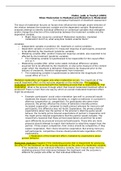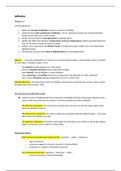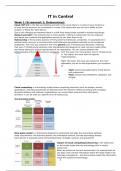Muller, Judd, & Yzerbyt (2005)
When Moderation Is Mediated and Mediation Is Moderated
In a conceptual framework of treatment assessment
The issue of moderation focuses on factors that influence the strength and/or direction of
the relation between the treatment variable and the dependent variable. Moderational
analyses attempt to identify individual difference or contextual variables that strengthen
and/or change the direction of the relationship between the treatment variable and the
dependent variable.
Might these two issues be combined? Moderated mediation, mediated
moderation? And if so, what analytical models underlie them?
Variables:
o Independent variable or predictor (X): treatment or control condition.
o Dependent variable or outcome (Y): measured response of participants, presumed
to be affected by the treatment (predictor variable).
o Mediating variable (Me): another measured response variable, also expected to be
affected by the treatment (predictor variable).
The mediating variable is hypothesized to be responsible for the causal effect
of X on Y.
o Moderating variable (Mo): either some stable individual difference variable,
assumed not to be affected by the treatment, or else some measure of the context
under which the treatment is delivered. Presumed to be measured prior to the
delivery of treatment, therefore independent from treatment.
The moderating variable is hypothesized to determine the magnitude of the
causal effect of X on Y.
Mediated moderation can happen only when moderation occurs: the magnitude of the
overall treatment effect on the outcome depends on the moderator. The mediated
moderation question is concerned with the mediating process that is responsible for that
moderation. What is the process through which that overall moderated treatment effect is
produced? There is more than one way by which an overall moderated treatment effect
might be produced.
Example: participants’ social value orientation (pro-self vs. prosocial) would
moderate the impact of primes (morality vs. might) on behavior in a prisoner’s
dilemma (cooperative vs. competitive). For participants who were more
prosocial, the primes affected the choice of behaviors (morality primes
increased cooperation, compared to might primes) whereas for more pro-self
participants, this difference was not found. Explanation: the primes produce
expectations about how the partner in the prisoner’s dilemma game would
behave: the morality prime induced expectations of partner’s cooperation and
the might prime induced expectations that the partner would compete. The
researchers reasoned that these primed expectations would then be acted
upon differently by prosocial and pro-self participants. Those who are more
prosocial should attempt to match their behavior to what they expect from the
partner: if they expect competition, their choice should be competitive; if they
expect cooperation, their choice should be cooperative. But among more pro-
self participants, competitive choices should predominate regardless of the
expectations.
> Moderation of the treatment effect, mediated by expectations about
partner behavior.
Moderated mediation happens if the mediating process that is responsible for producing
the effect of the treatment on the outcome depends on the value of a moderator variable.
- If the moderator is an individual difference variable, then it would mean that the
mediating process that intervenes between the treatment and the outcome is
different for people who differ on that individual difference.
When Moderation Is Mediated and Mediation Is Moderated
In a conceptual framework of treatment assessment
The issue of moderation focuses on factors that influence the strength and/or direction of
the relation between the treatment variable and the dependent variable. Moderational
analyses attempt to identify individual difference or contextual variables that strengthen
and/or change the direction of the relationship between the treatment variable and the
dependent variable.
Might these two issues be combined? Moderated mediation, mediated
moderation? And if so, what analytical models underlie them?
Variables:
o Independent variable or predictor (X): treatment or control condition.
o Dependent variable or outcome (Y): measured response of participants, presumed
to be affected by the treatment (predictor variable).
o Mediating variable (Me): another measured response variable, also expected to be
affected by the treatment (predictor variable).
The mediating variable is hypothesized to be responsible for the causal effect
of X on Y.
o Moderating variable (Mo): either some stable individual difference variable,
assumed not to be affected by the treatment, or else some measure of the context
under which the treatment is delivered. Presumed to be measured prior to the
delivery of treatment, therefore independent from treatment.
The moderating variable is hypothesized to determine the magnitude of the
causal effect of X on Y.
Mediated moderation can happen only when moderation occurs: the magnitude of the
overall treatment effect on the outcome depends on the moderator. The mediated
moderation question is concerned with the mediating process that is responsible for that
moderation. What is the process through which that overall moderated treatment effect is
produced? There is more than one way by which an overall moderated treatment effect
might be produced.
Example: participants’ social value orientation (pro-self vs. prosocial) would
moderate the impact of primes (morality vs. might) on behavior in a prisoner’s
dilemma (cooperative vs. competitive). For participants who were more
prosocial, the primes affected the choice of behaviors (morality primes
increased cooperation, compared to might primes) whereas for more pro-self
participants, this difference was not found. Explanation: the primes produce
expectations about how the partner in the prisoner’s dilemma game would
behave: the morality prime induced expectations of partner’s cooperation and
the might prime induced expectations that the partner would compete. The
researchers reasoned that these primed expectations would then be acted
upon differently by prosocial and pro-self participants. Those who are more
prosocial should attempt to match their behavior to what they expect from the
partner: if they expect competition, their choice should be competitive; if they
expect cooperation, their choice should be cooperative. But among more pro-
self participants, competitive choices should predominate regardless of the
expectations.
> Moderation of the treatment effect, mediated by expectations about
partner behavior.
Moderated mediation happens if the mediating process that is responsible for producing
the effect of the treatment on the outcome depends on the value of a moderator variable.
- If the moderator is an individual difference variable, then it would mean that the
mediating process that intervenes between the treatment and the outcome is
different for people who differ on that individual difference.












